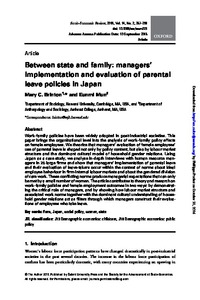Between state and family: managers' implementation and evaluation of parental leave policies in Japan

2016
14
2
April
257-281
gender ; management attitude ; parental leave ; women workers
Social protection - Family responsibilities
http://dx.doi.org/10.1093/ser/mwv021
English
Bibliogr.
"Work–family policies have been widely adopted in post-industrial societies. This paper brings the organizational level into the analysis of work–family policy effects on female employees. We theorize that managers' evaluation of female employees' use of parental leave is shaped not only by policy content, but also by labour market structure and the dominant cultural model of household gender relations. Using Japan as a case study, we analyse in-depth interviews with human resource managers in 25 large firms and show that managers' implementation of parental leave and their evaluation of leave-takers occur within the context of norms about ideal employee behaviour in firm-internal labour markets and about the gendered division of care work. These conflicting norms produce managerial expectations that can only be met by a small number of women. The article contributes to theory and research on work–family policies and female employment outcomes in two ways: by demonstrating the critical role of managers, and by showing how labour market structure and associated work norms together with the dominant cultural understanding of household gender relations act as filters through which managers construct their evaluations of employees who take leave."
Digital
The ETUI is co-funded by the European Union. Views and opinions expressed are however those of the author(s) only and do not necessarily reflect those of the European Union or the ETUI.